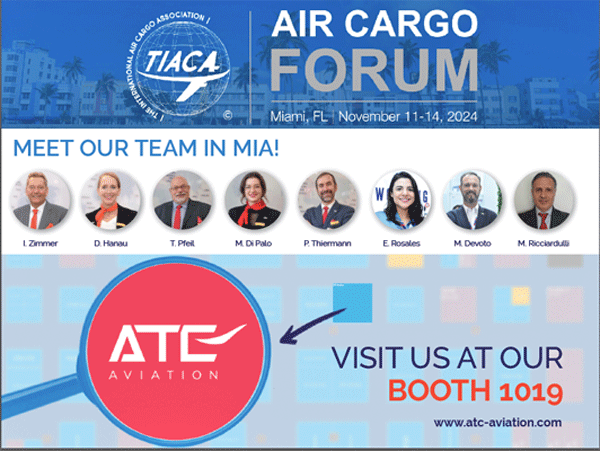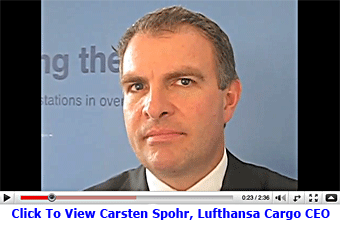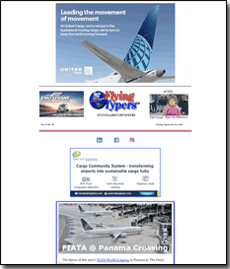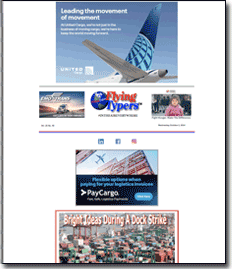
 |
 |
 #INTHEAIREVERYWHERE |
| Vol. 23 No. 42 | Tuesday October 15, 2024 |
| |
 |
Lionel van der Walt has headlined world air cargo news often for his service as President of IATA Cargo Network Services (CNS) and at onset as part of the team that changed logistics forever at PayCargo. Today based in Raleigh, North Carolina, Lionel emerges in 2024 as Chief Commercial Officer for Nallian charged with developing strategic partnerships. Here Lionel makes the case for accelerating digital transformation as the future rushes into the everyday and U.S. dockworkers walkouts halted half the nation's ocean shipping. “The East Coast port strike really shook things up in the logistics world, causing major headaches for the ports, air cargo, freight forwarders, and ground transportation companies. “But here's the thing: companies that are ahead of the curve with digital transformation and cutting-edge tech were in a much better spot to handle the chaos and even come out on top. “Ports were jammed up, shipments were delayed, and the whole supply chain was feeling the squeeze. “That drove up demand for air freight services, which meant higher costs and a scramble for capacity. Freight forwarders were in the thick of it, trying to keep things moving, and having to come up with some pretty creative solutions. “Ground transportation wasn't getting off easy either. Trucking services were in high demand to move goods from clogged ports to their final destinations, leading to higher costs and more pressure on an already stretched industry. “But here's where the forward-thinkers shine. “Companies that have embraced digital transformation and tech are way better equipped to handle these challenges. With advanced data analytics, real-time tracking, and automated systems, they can quickly adapt and make smart decisions to keep things running smoothly. “AI and predictive analytics, for example, can help anticipate delays and reroute shipments, minimizing disruptions and keeping deliveries on track. “Digital platforms that facilitate collaboration and communication are also a game-changer. These enable companies to share real-time info with partners and stakeholders, coordinating efforts more effectively and thereby quickly tackling issues as they come up. “And let's not forget about automation and robotics. Companies that have invested in these technologies can handle the increased demand for air cargo and ground transportation services more efficiently. Automated systems streamline operations, reduce manual labor, and boost efficiency, allowing these companies to scale up quickly and meet the surge in demand. “So, while the port strike threw a wrench in the works for the logistics industry, forward-thinking companies that are leading the charge with digital transformation and cutting-edge technologies were in a prime position to effectively manage the disruption, weather the storm, and maybe even benefit from it.” GDA |
 |
Nicolette van der Jagt is a regular guest of the FlyingTypers. She successfully directs CLECAT since the end of 2011, when I handed the baton over to her to take my new position in FIATA in Zurich. As it happened, we managed to keep our friendship going all these years and we even manage to meet every now and then, perhaps less often than we would wish. In early August, Nicolette called from Lake Maggiore and said she was visiting the area where I live, Piedmont in NW Italy. I took the opportunity to meet and spend some time together with her and her lovely daughter Carlijn, whom I had met as a toddler in Brussels in the early years of my assignment in CLECAT. We spent almost three days together and there was time for talking, sightseeing and some cuisine! So let us start with the policy issues, as this is Nicolette’s business and probably the most interesting part for most readers. Nicolette wrote a special note for the FlyingTypers on “The Future of EU Transport and Logistics: Ursula von der Leyen's Vision for the Next Five Years.” Here are Nicolette’s words as received. I shall then take over to tell you more about the places we visited and the food . . . “With new, ambitious MEPs joining forces in the European Parliament in July and a re-elected Commission President, we're set for another five years to innovate and equip the EU economy with the tools it needs. In Strasbourg, Ursula von der Leyen unveiled her vision for the next European Commission, addressing key industry challenges. She promised a brand new Clean Industrial Deal within her 100 days, focusing on channelling more investment into infrastructure, industry, and energy-intensive sectors to cut high energy costs. Recognising the challenges of European business such as unfair competition, higher energy prices, skills and labour shortages and difficulties in accessing capital they need, her European Prosperity Plan includes the following elements: 1) Increasing productivity via more and smarter digitalisation, repurposing much-needed skills and cutting red tape. 2) Achieving 90% emissions reduction by 2040 and continuing the Green Deal's goals via an 'Industrial Decarbonisation Accelerator Act'. 3) Deepening and strengthening the single market, following the recommendations of Enrico Letta's High-Level report published in April. Additionally, proposals will be presented for a Single Market for defence products and services, with the aim to foster a trusted European cybersecurity industry. 4) Massive private and public investments, with a Competitiveness Fund targeting cross-border projects that boost competitiveness and innovation. To be fit for 55, these significant investments are essential. This includes improving charging facilities and infrastructure in critical trade corridors. But also enhancing connectivity between Member States, both digitally and via roads and railways. Further development of efficient, multimodal transport are key to decrease congestion on the road and grid, to reduce emissions and to make sure Europe's economy keeps running. The Commission aims at simplifying, consolidating, and codifying legislation to eliminate overlaps and contradictions while maintaining high standards. Commissioners, led by a Vice-President for Implementation and Simplification, will focus on reducing administrative burdens and enhancing enforcement. The Commission will "stress-test the entire EU acquis" and hold regular dialogues with stakeholders to ensure regulations align with ground realities and address overly burdensome rules that hinder large companies' competitiveness. Future legislation will also be designed with small business in mind via a new SME and competitiveness check to help avoid unnecessary administrative burdens. It should be noted that setting targets for 2030 is one thing, the journey to achieve them is equally important. The question is how this plan will be realised with a lot of new initiatives ahead. The Commission President has clearly listened to industry and its concerns expressed over recent times. CLECAT particularly welcomes the promise of ‘making business easier’ and the cutting of red tape. The question is how this will be realised in view of all the new legislation to be implemented in the coming years. To give an example: CLECAT has been working tirelessly to raise awareness of the EU Deforestation Regulation (EUDR) among our members and their clients, the European exporters and importers. This is an important piece of legislation in tackling global deforestation but many have not realised the scope of the legislation. Customs service providers need to prepare Due Diligence regimes when accepting service contracts for EUDR goods. Such preparation ensures that transport equipment, warehouses, customs agencies, and EU border crossing points are not overwhelmed with uncleared EUDR goods and that our members do not end up with unpaid return freight costs. With no transitional period, de minimis, testing environment or major simplification provided so far by the European Commission for implementation, the December implementation deadline is an increasingly looming pressure. Over the past five years, Europe has set important goals for achieving a net-zero, resilient, smart, and sustainable future. Alongside these goals, various legislative initiatives, have been put into place. However, despite good intentions, recent EU trade-related measures like the Corporate Sustainability Reporting Directive (CSRD), the EU's Carbon Border Adjustment Mechanism (CBAM), and the new import control systems (ICS2) have created bureaucracy and costs for companies. New regulations, though possibly suitable for large companies are overly complex and burdensome for SMEs, making compliance technically and practically difficult for these smaller businesses. CLECAT has therefore called for a reset of the pace of new regulatory initiatives as seen over recent years. The volume of the new legislation, their intricate connections, and the speed at which they have been finalised present challenges in assessing their impact and determining the most cost-effective means of implementation for fostering a sustainable, net-zero, socially responsible, and resilient future for Europe. We are encouraged by the vision of the Commission’s President to support SME’s. CLECAT has in its memorandum for the next 5 years asked for targeted support and funding for SMEs, which are often drivers of innovation and economic growth remains important. Every legislative initiative should be accompanied by a regulatory impact assessment with a systematic application on the impact of SMEs. Looking ahead to the new EU legislative cycle, initiatives for low- and zero-emission freight transport, both at the European and national level, must actively support the decarbonisation of all transport modes. The green transition involves implementing incentives, enabling policies, and ensuring continue ample funding schemes while promoting the adoption of green technologies. Without proper access to finance and without immense public investments, the energy transition and the competitiveness of the industry are at stake. Together with other stakeholders, CLECAT is collaborating closely with policymakers to pave the way towards achieving Fit for 55, ensuring Europe remains a climate and business-friendly continent. This will involve discussions with new MEPs to explain them the realities of global supply chains since despite of the good intentions and willingness, business will be put to test in view of the geopolitical context. Today, bottlenecks and disruptions in the flow of goods in and beyond Europe, due to the close and sometimes inflexible interdependencies of transport modes, routes and suppliers continue to pose major challenges to business. As transport is especially sensible to stress and shocks, policymakers need to integrate resilience in their policies improving regulatory systems to make them more agile and flexible when coping with crisis situations. This will be debated with new MEPs at the first event of the European Logistics Platform organised with CLECAT taking place on the 11th September in Brussels.” This long list of issues tells you how busy Nicolette is and has been since her return to Brussels after the short vacation. She is in charge of defending the interests of the EU freight forwarding and logistics community: a pretty sizeable one, considering the EU’s foreign trade.
|
|
|
This Friday October 18, The Wings Club Gala Dinner will be held at the New York City midtown Hilton. It is an annual event that marks a return to normal of sorts as post-pandemic fades even further into a brave new world. Here is one of the most prestigious commercial aviation events anywhere in the world. It dates all the way back to he beginnings of modern aviation and has featured the greatest aviation leaders. For 2024, the always sold-out gathering will fill the grand ballroom of The New York Hilton to present its 2024 Distinguished Achievement Award to Carsten Spohr, Chief Executive Officer, Deutsche Lufthansa. Carsten Spohr has been Chairman and Chief Executive Officer of the Lufthansa Group since May 1, 2014, and leads this global aviation group consisting of a total of 300 subsidiaries and 105,000 employees worldwide.  We
knew Carsten when this former pilot headed up Lufthansa Cargo. Thinking
back 14 years, we recall an easy, quite effusive and ready to roll cargo
boss, in a brief video created in 2010, when we talked to him inside a hangar
at Leipzig during the AeroLogic launch. We
knew Carsten when this former pilot headed up Lufthansa Cargo. Thinking
back 14 years, we recall an easy, quite effusive and ready to roll cargo
boss, in a brief video created in 2010, when we talked to him inside a hangar
at Leipzig during the AeroLogic launch. To be sure there have been hundreds or maybe even a thousand videos created since then. Just before we spoke, Carsten nodded and smiled, acknowledging a line pilot, who was standing greeting guests at the ladder of the big B777 freighter parked in the hangar. That relaxed “fellow captain of the clouds” moment has never been forgot. The Wings Club was born in Manhattan, on May 15, 1942, where once upon a time the giants of commercial aviation, meaning the legacy carriers of the United States of America all had their corporate offices and where every overseas air carrier did not feel quite at home unless it operated a headquarters and storefront ticket office on fashionable 5th Avenue. Past recipients of The Wings Club Award include Fred Smith, founder of FedEx (in 1993), and Robert Crandall (in 1994), who as CEO of American Airlines created the first major frequent flyer program and modern airline reservation system. In 1977, Laurance Rockefeller, who personally helped and contributed to our saving The Marine Air Terminal (now a historic landmark) at LaGuardia Airport, was honored by The Wings Club. In 1996, Herb Kelleher, the wonderful plain-spoken character and founder of Southwest Airlines, who led the airline to greatness showed up and filled several tables with folks dressed in tuxedoes and ten-gallon hats & cowboy boots, the favored garb in Texas. Wings Club conducts monthly luncheons with top speakers at The Yale Club of New York City in Manhattan. More: e-mail WingsClubEvents@wingsclub.org, or call +1 212.867.1770 ext. 101. GDA |
 |
If
You Missed Any Of The Previous 3 Issues Of FlyingTypers Access complete issue by clicking on issue icon or Access specific articles by clicking on article title |
||
 Vol. 23 No. 39 FIATA At Panama Crossing |
 Vol. 23 No. 40 Bright Ideas During A Dock Strike Chuckles for October 2, 2024 Buffalo Airways Cargo Barges Ahead |
 Vol. 23 No. 41 The Future At Your Fingertips FIATA President In The Corridors Chuckles for October 10 This BUD Is For You Johan Martin Schröder Matters |
Publisher-Geoffrey Arend • Managing
Editor-Flossie Arend • Editor Emeritus-Richard Malkin |
Send comments and news to geoffrey@aircargonews.com
|